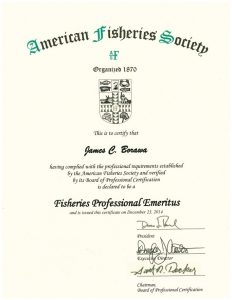After being certified as a Fisheries Professional by the American Fisheries Society for 22 years, Jim recently achieved Emeritus Status. This achievement follows a distinguished 30-year career as a Fisheries Biologist with the North Carolina Wildlife Resource Commission (NCWRC) and 5 years’ service as a part-time Environmental Scientist and Conservation Planner with Equinox. 
Jim states, “As a fisheries biologist I always valued certification as an acknowledgement by the fisheries profession that I was striving to develop skills to meet the needs of the position I was in. I viewed the requirements to maintain certification as a catalyst for seeking continuing education opportunities whether it was learning new field techniques, expanding computer abilities, or developing leadership skills. I have always subscribed to the motto — When you are through learning, you are through — I believe the certification program has encouraged me to stay true to that belief. ”
As a field biologist, Jim led the efforts at the NCWRC to implement standard trout population sampling and data analysis procedures as well as designing and carrying-out angler creel surveys using state-of-the-art methodologies. As Supervisor of the Watershed Enhancement Program, Jim completed the North Carolina Public Manager Program where he was presented the Askew Award for his project to develop a cross-divisional stream restoration progra m.
m.
At Equinox, Jim became an expert in development of EPS compliant 9-element watershed management plans for Little Tennessee River in northern Macon County, Hunting Creek in Burke County, and Upper North Toe River in Avery and Mitchell counties. He achieved this by attending the Center for Watershed Protection’s Watershed Academy and by completing EPA’s web-based Watershed Management Training Program. Jim also has taught himself visual basic computer programming to automate analysis of pebble count data for stream restoration monitoring projects.
The requirements for certification also encouraged him to convey what he learned to other professionals through numerous technical reports, presentations at professional meetings, articles in the NCWRC’s Wildlife in North Carolina Magazine, and as an in-house trainer and mentor. For this work, he received the Best Fisheries Professional Paper award by the Southeastern Association of Fish and Wildlife Agencies in 1988 and recognition as Biologist of the Year in 2004 by the NCWRC Division of Inland Fisheries.
